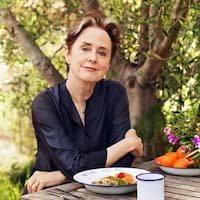Alice Waters Biography and Wiki
Alice Waters is an American restaurateur, author and chef famously known as the founder and owner of Chez Panisse restaurant based in Berkeley, California. The restaurant is well known for its farm-to-table movement and for pioneering California cuisine.
Alice Waters Education
Alice moved on from the University of California, Berkeley, getting a degree in French social examinations in 1967. While at Berkeley, she concentrated on abroad in France, where she looked for nearby produce and arranged new, basic food sources to upgrade the table insight. During her time in France, she says she “inhabited the lower part of a market road” and “took everything in as a natural side effect”.
Alice Waters Age and Birthday
How old is Alice Waters? Alice is 81 years old as of 2025. She was born Alice Louise Waters on 28 April 1944 in Chatham, New Jersey, United States. He celebrates his birthday on 28th April every year. READ: Eva Marcille
Alice Waters Nationality and Ethnicity
Alice holds American nationality and citizenship by birth. She was born and raised in Chatham, New Jersey, United States. She belongs to the White-American ethnicity/heritage/ancestry.
Alice Waters Parents | Family
Does Alice Waters have a sister? Alice was brought into the world by Charles Allen Waters, a Rutgers University graduate who was an administration specialist, and Margaret Waters, a homemaker. She is the second of four sisters.
Alice Waters Husband
Is Alice Waters married? Alice is married to Stephen Singer. The couple married in 1985 and has a daughter named Fanny Singer.
Alice Waters Height
Alice stands at an average height of 6 feet 1 inch (1.75 m) and maintains a body weight of 62 kg. READ: Elizabeth Banks
Alice Waters’s Net Worth
Alice is an American restaurateur, author, and chef with an estimated net worth of $20 million.
Alice Waters Books
Alice has written the books Chez Panisse Cooking (with Paul Bertolli), The Art of Simple Food I and II, and 40 Years of Chez Panisse. Her diary, Coming to My Senses: The Making of a Cook was distributed in September 2017 and delivered in soft cover in May 2018.
Alice Waters Schoolyard
Notwithstanding the Edible Schoolyard in Berkeley, there are five subsidiary Edible Schoolyard programs around the country. These remember Edible Schoolyards for New Orleans, New York City, Los Angeles, San Francisco, and Greensboro, North Carolina.
Alice Waters Lulu
Olney acquainted Waters with Lucien and Lulu Peyraud, proprietors of the Domaine Tempier grape plantation in Provence. Humdinger Peyraud’s grape plantation cooking altogether impacted Waters’ cooking and her menus at Chez Panisse. In her foreword to Olney’s book, Lulu’s Provençal Table, Waters expressed: “Lucien and Lulu’s kind energy forever, their adoration for the joys of the table, their profound association with the wonderful earth of the South of France – these were things I had seen at the films. Yet, this was serious. I felt quickly as though I had returned home to a second family.” READ: Bobbi Brown
Alice Waters Restaurants
In 1971, Waters opened Chez Panisse, which she named for a most loved character in a set of three of Marcel Pagnol’s films. All along, the eatery was a cooperative exertion. One outstanding coordinated effort was with Jeremiah Tower, who made a portion of the recipes that she later distributed under her name.
Tower took the natural fixings and merged them into a more refined menu. Chez Panisse was planned to serve fundamentally as where Waters could engage her companions. Understanding the trouble in obtaining new, top-notch fixings, Waters started constructing an organization of neighborhood ranchers, craftsmen, and makers and kept on obtaining the eatery’s fixings through her nearby network.
Waters opened the higher-up Chez Panisse Café, an idea supported by Tower, in 1980. The bistro serves an individual menu for lunch and supper. In 1984, Waters opened Café Fanny, named after her little girl, between the wine shop of Kermit Lynch and Acme Bread.
Bistro Fanny, which served breakfast and lunch in an easygoing, European-bistro setting, shut in 2012. Then, at that point, Waters chiefly centered around the significance of natural ranchers. Through Chez Panisse’s establishment, the undertaking called Edible Schoolyard was coordinated to make a climate for the understudies to figure out how to develop their own food and set it up.
Alice Waters Organic Food
Key to the activities and reasoning of Chez Panisse is Waters’ and the eatery’s commitment to utilizing natural fixings. Waters has turned into a crusader for natural food varieties, accepting that they are both better for the climate and for individuals’ well-being as well as tasting better than monetarily developed, non-natural food varieties.
Waters turned into a natural aficionado nearly unintentionally, asserting that what she was initially after was the taste. Waters’ momentum natural food plan incorporates transforming the USDA school lunch program to incorporate natural, neighborhood products of the soil and having an impact on how America eats, yet her energy for organics began at her eatery, where she found that natural fixings were the fundamental component important to make tasty food.






